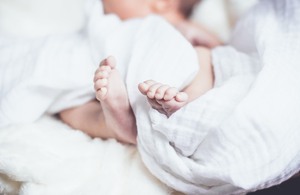Whooping cough infections rise
553 new cases of whooping cough confirmed in January.

New data published today by the UK Health Security Agency (UKHSA) shows there has been a continued increase in pertussis (whooping cough) cases at the start of this year, with 553 confirmed in England in January, compared with 858 cases for the whole of last year (2023).
The increase in whooping cough across England is occurring after a prolonged period of low case numbers due to restrictions and reduced social mixing patterns during the COVID-19 pandemic. We know that cases of whooping cough rise cyclically every few years, with the last peak year, 2016, recording 5,949 cases. The current increase is coming at a time when there has been a steady decline in uptake of the vaccine in pregnant women and in children.
In response to increasing case numbers, the UKHSA is reminding mums-to-be to get protected against whooping cough so that their young baby has protection from birth against this serious disease and to ask their midwife if they are unsure. UKHSA is also urging parents to check that their children are vaccinated against whooping cough, which is offered to all infants at 8, 12 and 16 weeks of age (as part of the 6-in-1 combination vaccine) with an additional dose included in the pre-school booster vaccine.
This reminder is part of the UKHSA’s new Childhood Immunisation Campaign urging parents to check the vaccination status of their children against measles and other serious diseases, which went live across a range of media channels at the start of this week. Parents are being asked to respond to invites from the NHS or to book an appointment with their GP practice if their child has not received all their routine vaccines.
Data for January show that there were 22 infants aged under 3 months diagnosed with whooping cough. These infants, who are too young to be fully vaccinated, are at greater risk of severe disease, including death. UKHSA is strongly encouraging expectant mothers to take up the maternal vaccine. Vaccination of pregnant women is 97% effective at preventing death in young infants from whooping cough.
As a result of the rising cases in 2024, the UKHSA has also moved to a monthly reporting cycle for whooping cough infections to provide timely information on disease rates across the country to help local public health teams respond to outbreaks and to support the health professionals delivering the routine NHS Childhood Vaccination Programme.
Dr Gayatri Amirthalingam, Consultant Epidemiologist at UK Health Security Agency, said:
Whooping cough can affect people of all ages but for very young infants, it can be particularly serious. However, vaccinating pregnant women is highly effective in protecting babies from birth until they can receive their own vaccines. Parents can also help protect their children by ensuring they receive their vaccines at the right time or catching up as soon as possible if they have missed any. If you’re unsure, please check your child’s red book or get in touch with your GP surgery.
Steve Russell, National Director for Vaccinations and Screening at NHS England, said:
With whooping cough on the rise, it is important that families come forward to get the protection they need.
If you are pregnant and have not been vaccinated yet, or your child is not up-to-date with whooping cough or other routine vaccinations, please contact your GP as soon as possible, and if you or your child have symptoms ask for an urgent GP appointment or get help from NHS 111.
The new campaign comes after a steady decline over the past decade in uptake of all childhood vaccinations offered through the routine NHS programme in England. The number of 2-year-olds who completed their 6-in-1 vaccinations as of September 2023 is 92.9%, compared to 96.3% in March 2014. Uptake of the maternal pertussis vaccine, offered to women in every pregnancy, has also dropped from over 70% in September 2017 to around 58% in September 2023.
Whooping cough, clinically known as pertussis, is a bacterial infection which affects the lungs. The first signs of infection are similar to a cold, such as a runny nose and sore throat, but after about a week, the infection can develop into coughing bouts that last for a few minutes and are typically worse at night. Young babies may also make a distinctive “whoop” or have difficulty breathing after a bout of coughing.
If anyone in your family is diagnosed with whooping cough, it’s important they stay at home and do not go into work, school or nursery until 48 hours after starting antibiotics, or 3 weeks after symptoms start if they have not had antibiotics. This helps to prevent the spread of infection, especially to vulnerable groups. However, vaccination remains the best protection for babies and children.